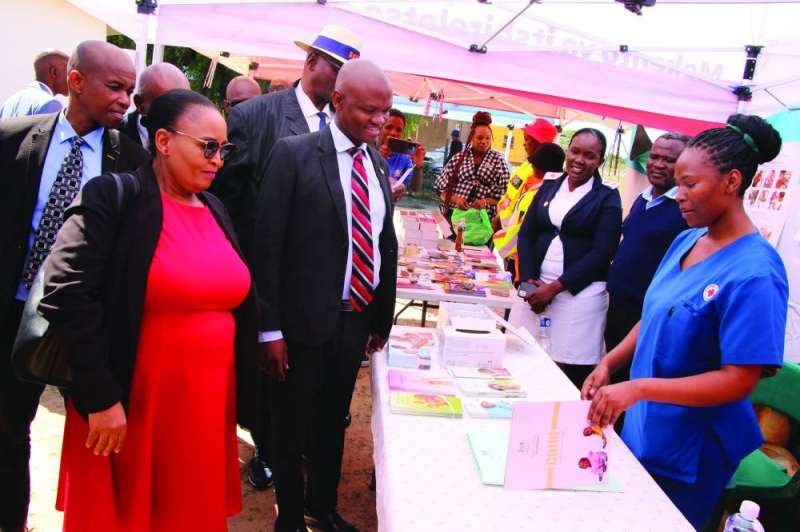Motokwe hosts Vaccination Day for routine immunisation
Nnasaretha Kgamanyane | Tuesday April 16, 2024 08:48


The event followed data from the Ministry of Health which showed a drop in routine immunisation coverage since the start of the COVID-19 pandemic.
Health Minister, Edwin Dikoloti, hailed the event as a significant milestone in advancing Integrated Community Child Health Services in Botswana, with a sharp focus on Kweneng. “In November 2020, my ministry rolled out the Integrated Based Community Health Services (ICHBS) guidelines to push forward the ‘one health approach,’ for coordinated and standardised health provision in our communities,” he revealed.
“Because children are amongst the most vulnerable groups, we launched the Child Health Days initiative to deliver a bundle of impactful and cost-effective interventions. “Consequently, we observe child health days annually in May and November to maintain momentum throughout the year.” Dikoloti stressed that these interventions aimed to slash under-five morbidity and mortality, thus boosting child survival rates.
He noted that implementing these high-impact interventions will redefine and revitalise primary healthcare in the sector. Referring to the State of the World Children’s report of 2023, he highlighted that globally, 67 million children missed vaccinations between 2019 and 2021. “This indicates that children born before or during the COVID-19 pandemic, who would typically receive vaccinations, might have missed vital shots.
This calls for urgent action to catch up with those who missed immunisations during that tough period. Botswana, like the rest of the world, faced challenges and setbacks due to COVID-19, affecting all sectors, including healthcare access,” Dikoloti added. “During that time, essential services were diverted to those with co-morbidities and emergencies. Consequently, routine immunisation coverage declined, as mentioned earlier. With support from UNICEF and BRCS, my Ministry mobilised and implemented child health services for hard-to-reach communities, including Kweneng District.
These efforts involved house-to-house visits, community engagements, mobile stops, outreach programmes, and community dialogues. Through these efforts, we gathered information to inform decision-making and strengthen our primary healthcare system. Community health workers identified children missing routine vaccinations,” he elaborated. UNICEF representative, Dr Joan Matji, emphasised that the event shed light on critical issues regarding child survival and community well-being. She expressed alarm that globally 20.5 million children missed one or more vaccines in 2022, and 24.4 million missed vaccinations in 2021, largely due to disruptions exacerbated by COVID-19.
She, however, said they were also aware that there were other factors contributing to low vaccination of children.
“Implementation research undertaken through a similar programme in five districts, including Kweneng, in 2021 showed that 49% of children who were not vaccinated, it was due to the lack of agency by caregivers or child negligence, while 25% cited unavailability of vaccines during the scheduled time. Furthermore, 24% of caregivers missed taking children to child welfare clinics,” she said. “To address these challenges, community engagement and behaviour change approaches are crucial to raise awareness amongst caregivers and encourage them to utilise immunisation services and broader child welfare services for child survival and thriving.
I urge everyone present to ensure children receive immunisations. Vaccines are essential for every child, including those in Motokwe, to grow up healthy.” Joseph Segodi, UNICEF's social and behaviour change officer, noted that UNICEF Botswana, in collaboration with USAID, supports a Community-based Health Services programme to accelerate routine immunisation in Kweneng District.
He explained that the programme also pilots COVID-19 vaccine integration at community and health facility levels to draw lessons for developing the national COVID-19 vaccine integration strategy. “At UNICEF, our programmes include child health, including routine immunisation for children under five.
However, during the emergency period, we also focused on sensitising the community about COVID-19 vaccines. “Before the pandemic, Botswana was performing well in terms of immunisations, reaching a rate of 90%. However, post-COVID-19, our rates dropped to 40% or less in some parts of the country,” he revealed. Kgosi Batho Tshoso of Motokwe highlighted reluctance towards vaccinations due to perceived negative side effects, requiring substantial effort to convince people to participate. He also raised concerns about the dilapidated state of Motokwe Clinic, stressing its inadequacy despite being a referral centre for nearby areas. Tshoso urged relevant stakeholders to construct a larger clinic or hospital and implored the minister to employ a doctor for their clinic. Additionally, he raised concerns about the quality of water, which he claimed posed health risks due to its unpleasant taste and odour.
